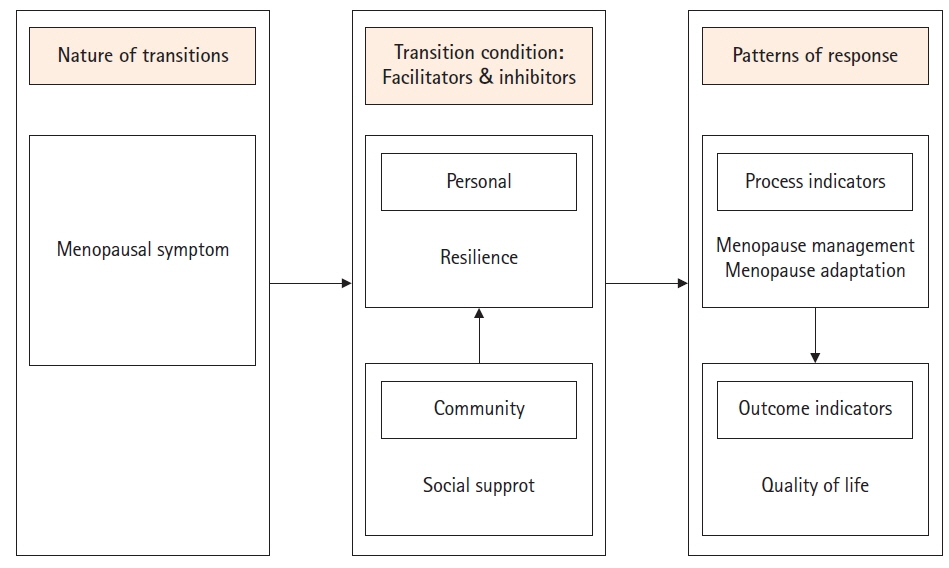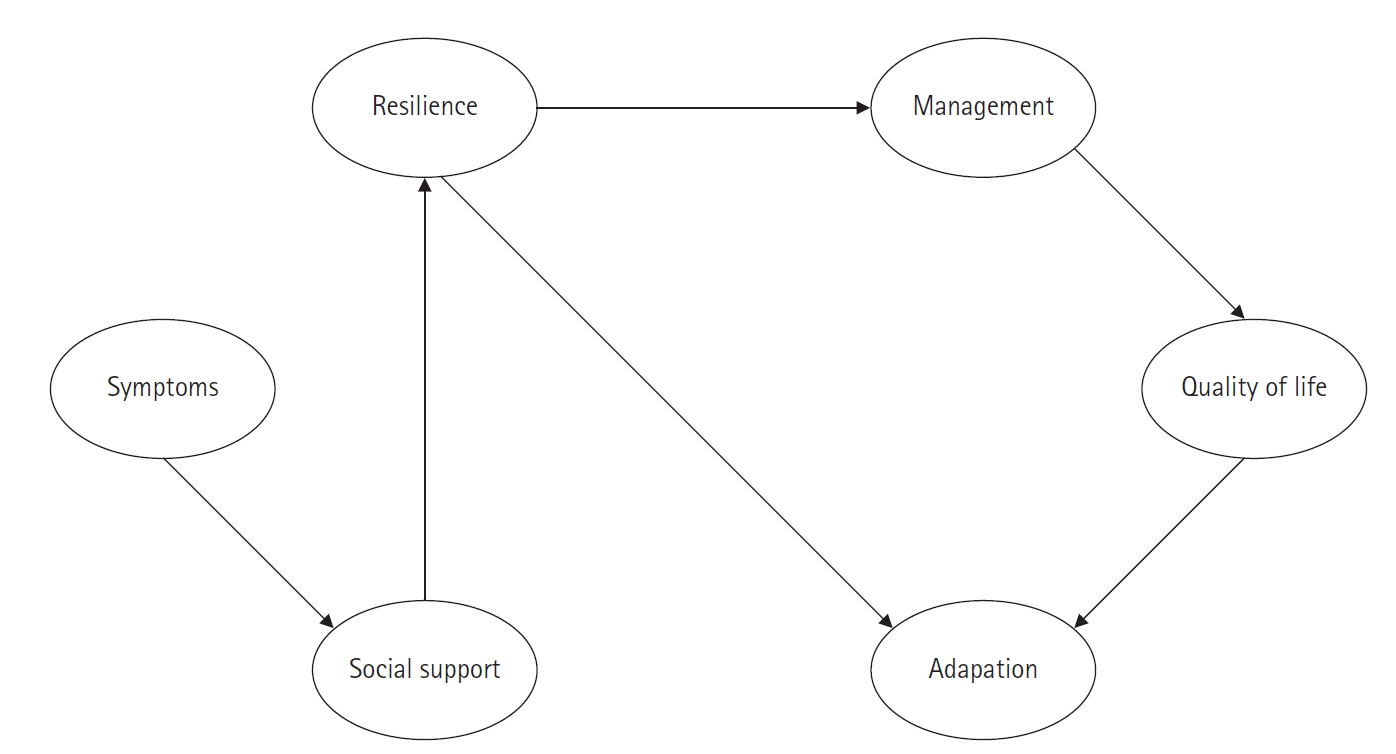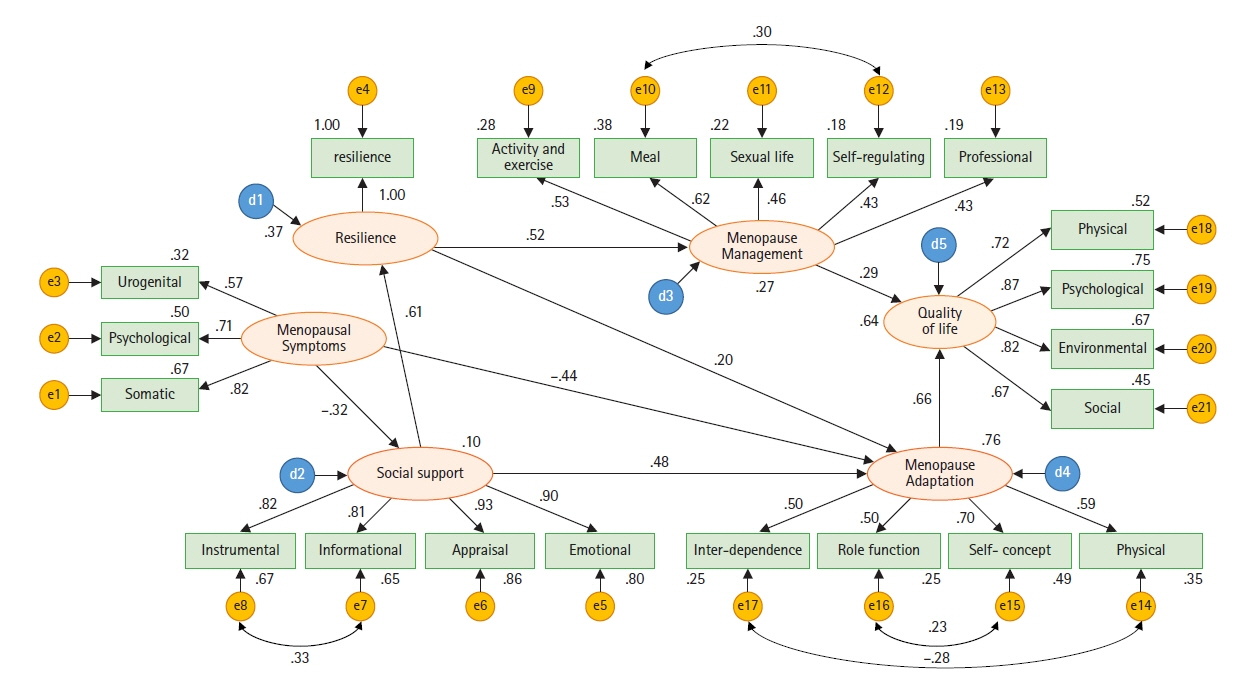Korean J Women Health Nurs.
2022 Sep;28(3):210-221. 10.4069/kjwhn.2022.08.16.
A menopausal transition model based on transition theory
- Affiliations
-
- 1Department of Nursing, College of Health and Welfare, Woosong University, Daejeon, Korea
- 2College of Nursing, Chungnam National University, Daejeon, Korea
- KMID: 2535438
- DOI: http://doi.org/10.4069/kjwhn.2022.08.16
Abstract
- Purpose
The purpose of this study was to construct a hypothetical model based on Meleis and colleagues’ Transition Theory and a literature review to explain women’s menopausal transition, constructing a modified model considering previous studies and model fit and testing the effects between variables. Methods: With a correlational survey design, middle-aged Korean women aged 40 to 64 years who had experienced menopausal symptoms were recruited and filled out a self-administered study questionnaire. Measures included menopausal symptoms, resilience, social support, menopause management, menopause adaptation, and quality of life. The data were analyzed using SPSS 24.0 and AMOS 24.0. Results: The model fit indices were considered acceptable: χ2 /degree of freedom=2.93, standardized root mean residual=.07, comparative fit index=.90, and parsimonious normed fit index=.73. All eight direct-effect paths—from menopausal symptoms to support and adaptation, from support to adaptation and resilience, from resilience to adaptation and management, from management to quality of life, and from adaptation to quality of life—were significant. The explanatory power of the menopause transition model was 63.6%. Conclusion: Women who experience menopausal symptoms may be able to maintain and improve their quality of life if menopause management and menopause adaptation are successful through resilience and social support. Future research is needed to confirm whether strengthening facilitation as a nursing intervention strategy may promote healthy response patterns.
Keyword
Figure
Reference
-
References
1. Hong E, Kang YS. Structural equation modeling on healthy menopausal transition. J Korean Acad Nurs. 2015; 45(1):64–75. http://doi.org/10.4040/jkan.2015.45.1.64.
Article2. Lee EJ. Factors influencing adaptation to menopause in middle-aged women. Korean J Women Health Nurs. 2018; 24(4):336–345. https://doi.org/10.4069/kjwhn.2018.24.4.336.
Article3. Kim JH, Kim MR, Lee YJ, Hwang SJ, Jo HH, Ryu KS, et al. Serum levels and expressions of Inhibin A and Inhibin B in the ovaries of perimenopausal women. Korean J Obstet Gynecol. 2003; 46(12):2392–2402.4. Lee JH, Kim KH, Kim GD. The mediating effect of cognitive function on climacteric symptoms and quality of life in the middle-aged women. J Korea Acad-Ind Coop Soc. 2014; 15(7):4439–4448. https://doi.org/10.5762/KAIS.2014.15.7.4439.
Article5. Yang KM. The effect of depression, life stress and resilience on quality of life in middle aged women. J Korean Acad Soc Home Care Nurs. 2015; 22(2):300–309.6. Kim KH. The factors influencing to quality of life of middle-aged women. J Korean Data Anal Soc. 2016; 18(1):497–508.7. Yeom YR, Kim A. Structural equation modeling on quality of life in middle-aged women with urinary incontinence. J Korean Acad Fundam Nurs. 2021; 28(1):43–55. https://doi.org/10.7739/jkafn.2021.28.1.43.
Article8. Kim AK. Yangsaeng and health related quality of life (HRQOL) in middle aged women. Korean J Women Health Nurs. 2010; 16(3):297–306. https://doi.org/10.4069/kjwhn.2010.16.3.297.
Article9. Kim MJ, Kang KJ. Effects of sanhujori and menopausal adaptation on health-related QOL in middle-aged women. Korean J Women Health Nurs. 2014; 20(1):62–71. http://doi.org/10.4069/kjwhn.2014.20.1.62.
Article10. Min SK, Lee CI, Kim KI, Suh SY, Kim DK. Development of Korean version of WHO quality of life scale abbreviated version (WHOQOL-BREF). J Korean Neuropsychiatr Assoc. 2000; 39(3):571–579.11. Lee YM, Kim GM, Jung YH. Factors affecting a health promoting lifestyle in middle-aged women. J Korea Content Assoc. 2014; 14(10):570–582. https://doi.org/10.5392/JKCA.2014.14.10.570.
Article12. Song AR. An analysis of the relationship between climacteric symptoms and management of menopause in middle-aged women. J Korean Acad Soc Nurs Educ. 2001; 7(2):308–322.13. Kim KW, Bae KE. Crisis adaptation of middle-aged women during climacteric period. Crisisonomy. 2017; 13(2):45–55. http://doi.org/10.14251/crisisonomy.2017.13.2.45.
Article14. Yoon JH, Han JH. A study on the psychological phenomenon experienced by menopausal middle-aged women. Korean J Couns. 2013; 14(4):2195–2212. https://doi.org/10.15703/kjc.14.4.201308.2195.
Article15. Kim AJ. QOL-BREF and Yangsaeng in Korean adult. J East-West Nurs Res. 2008; 14(2):8–15.16. Schumacher KL, Meleis AI. Transitions: a central concept in nursing. Image J Nurs Sch. 1994; 26(2):119–127. https://doi.org/10.1111/j.1547-5069.1994.tb00929.x.
Article17. Meleis AI, Sawyer LM, Im EO, Hilfinger Messias DK, Schumacher K. Experiencing transitions: an emerging middle-range theory. ANS Adv Nurs Sci. 2000; 23(1):12–28. https://doi.org/10.1097/00012272-200009000-00006.
Article18. Connor KM, Davidson JR. Development of a new resilience scale: the Connor-Davidson Resilience Scale (CD-RISC). Depress Anxiety. 2003; 18(2):76–82. https://doi.org/10.1002/da.10113.
Article19. Cho HM, Yoo EK. Effects of depression, family support on resilience in patients with gynecological cancer. J Korea Soc Wellness. 2015; 10(4):183–195.20. Yang JH, Kim OS. The structural equation model on resilience of breast cancer patients receiving chemotherapy. J Korean Acad Nurs. 2016; 46(3):327–337. https://doi.org/10.4040/jkan.2016.46.3.327.
Article21. Chang KM. Moderating effects of psychological resilience of the survivors of breast cancer patients on the influential relationships among the variables of body change stress, depression, and social adjustment. Korean J Stress Res. 2011; 19(2):165–174.22. Kim YS, Chung HJ. The effect of family support and self-differentiation on the college life adjustment of midlife married women students. Korean J Family Welf. 2014; 19(1):55–80.
Article23. Im EO, Meleis AI. A situation-specific theory of Korean immigrant women’s menopausal transition. Image J Nurs Sch. 1999; 31(4):333–338. https://doi.org/10.1111/j.1547-5069.1999.tb00513.x.
Article24. The World Health Organization Quality of Life Assessment (WHOQOL). development and general psychometric properties. Soc Sci Med. 1998; 46(12):1569–1585. https://doi.org/10.1016/s0277-9536(98)00009-4.25. ZEG Berlin. MRS-the Menopause Rating Scale developed by the Berlin Center for Epidemiology and Health Research [Internet]. Berlin: ZEG Berlin, Berlin Center for Epidemiology and Health Research;c2008. [cited 2018 Mar 20]. Available from: https://zeg-berlin.de/expertise/diagnostics-tools/menopause-rating-scale/languages/.26. Yu JP. The concept and understanding of structural equation modeling. Seoul: Hannare Publishing Co;2012. 567.27. Heinemann K, Ruebig A, Potthoff P, et al. The Menopause Rating Scale (MRS) scale: a methodological review. Health Qual Life Outcomes. 2004; 2:45. https://doi.org/10.1186/1477-7525-2-45.
Article28. Campbell-Sills L, Stein MB. Psychometric analysis and refinement of the Connor-davidson Resilience Scale (CD-RISC): validation of a 10-item measure of resilience. J Trauma Stress. 2007; 20(6):1019–1028. https://doi.org/10.1002/jts.20271.
Article29. Jung SY, Nam IS, You S. Validity and factor structure of the Connor-Davidson resilience scale in older adults in Korea. J Korea Gerontol Soc. 2016; 36(2):315–330.30. Park JW. A study to development a scale of social support. [dissertation]. Seoul: Yonsei University;1985. 150.31. Kim YS. The relationships among social support, self-esteem, depression and happiness of the retired leisure male sports participants. [dissertation]. Cheonan: Dankook University;2013. 91.32. Song AR. Development of an educational program for the management of menopause and it’s effect. J Korean Acad Nurs. 1998; 28(2):280–290. https://doi.org/10.4040/jkan.1998.28.2.280.
Article33. Choi NY, Choi SY, Jo HJ. A study on the degree of knowledge of menopause and management of menopausal women. Korean J Women Health Nurs. 1998; 4(3):402–415.34. Bae KE. Instrument development for adaptation of women in the menopause period. [dissertation]. Seoul: Ewha Women University;2006. 145.35. Park HS, Kim AJ, Bae KE. Life stress, life satisfaction, and adaptation of middle-aged women in the menopause period. Korean Parent-Child Health J. 2010; 13(2):55–62.36. So IS, Jeong HS. Predictive factors to health promotion behaviors in breast cancer patients using Pender’s health promotion model. J Korea Acad-Ind Coop Soc. 2017; 18(3):258–269. https://doi.org/10.5762/KAIS.2017.18.3.258.
Article37. Kim YW, Choi HK, Oh EJ. Convergence study of menopausal resilience of middle-aged women. J Digit Converg. 2018; 16(5):373–383. https://doi.org/10.14400/JDC.2018.16.5.373.
Article
- Full Text Links
- Actions
-
Cited
- CITED
-
- Close
- Share
- Similar articles
-
- Structural Equation Modeling on Healthy Menopausal Transition
- Mullerian inhibiting substance as a predictive marker of menopausal transition
- Transition Model of Middle-aged Women
- Concept analysis of transition to motherhood: a methodological study
- Mediating Effects of Transition Shock on the Relationships among Grit, Social Support, and Retention Intention for New Graduate Nurses




